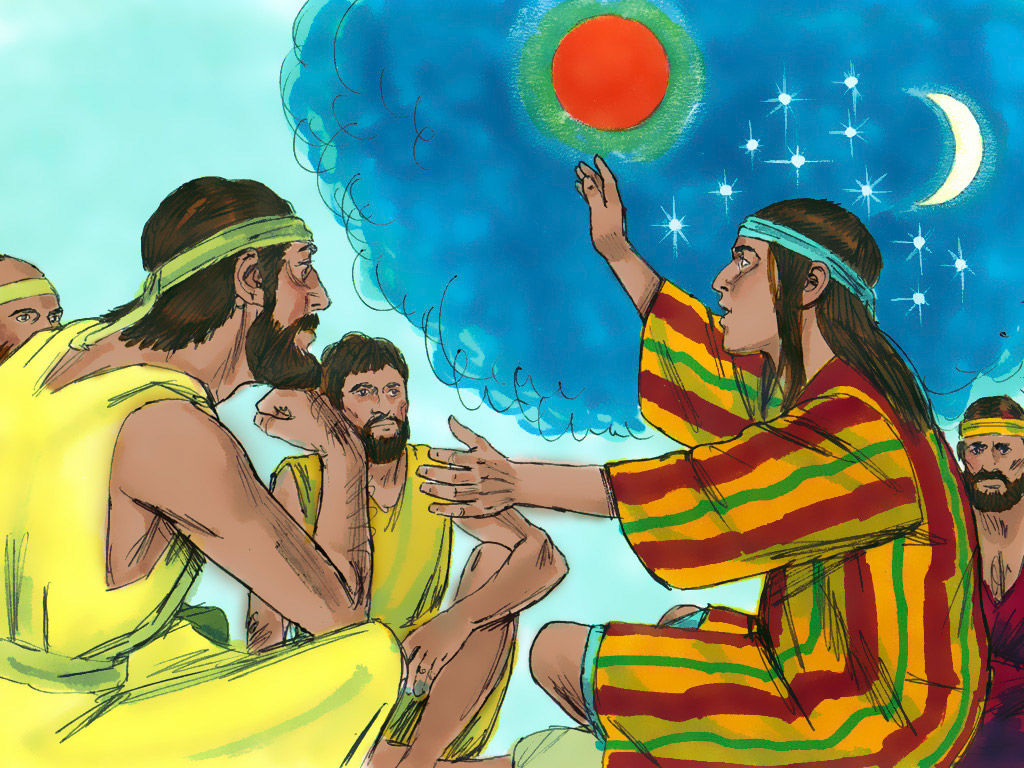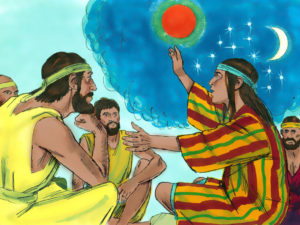 A few mazel tov shout-outs by close friends; here we go.
A few mazel tov shout-outs by close friends; here we go.
A big mazel tov to our dear friends Brenda and Dr. Larry Levitan upon the wedding earlier this week of their beautiful daughter Erica to Samuel Grossman, he the son of Debora and Dr. Elliot Grossman. Mazel tov to both extended families. May Erica and Samuel enjoy many many decades of pure marital bliss.
Mazel tov to Jodi & Tzachi Popowitz upon the birth of a baby boy, their first, and keyn yirbu! And big mazel tov wishes to our dear friends Shevy and Richie Cooperberg and to Raina and Moishe Popowitz, very excited grandparents. All are invited to the sholom zochor and bris. Details to follow for those really invited. May baby Popowitz bring his entire family only joy.
And a big big mazel tov to Yehuda Isaacs upon his engagement earlier this week to Sharona Kern, she the daughter of Sima & Jeffrey Kern. Was it just yesterday that we were at Yehuda’s bar mitzvah? Mazel tov wishes to our dear friends Doba and Kalman Isaacs and to the entire extended Isaacs and Treitel families. A very special shout out mazel tov to Yehuda’s grandmother, Mrs. Miriam Treitel.
Raboyseyee and Ladies
A Long History of Illicit Sex.
As the heylige Oisvorfer was reviewing this week’s parsha of Vayeshev and contemplating if there were pearls not previously mined in the form of interesting medroshim, and if there was anything that could be written that has not already been shared with his hundreds of thousands of readers -around the world mamish- in the previous six posting on this most incredible parsha – see archives at www.oisvorfer.com– his mind began to wander. No great surprise there: such wanderings began in pre 1-A. Ober, the RBSO did not forsake the Oisvorfer: In a flash of brilliance mamish -as you will soon read and agree- a machshovo (thought) flew into his head and wouldn’t you know, it involved a running theme: male personalities in our heylige Toirah, their women (and others), and sexual relations, mostly of the forbidden or at least questionable variety. No great surprise there either. Ober why are these things always on his and your minds? Why taka? It’s quite poshit (simple). Because this topic is prominently featured and discussed in kimat every parsha in Sefer Bereishis we have read to date, beginning with Odom Horishoin and his wife Chava (Adam & Eve). And before we get to this week’s parsha which features not one, but two such amazing and incredible incidents, let’s quickly chazir what we learned to date.
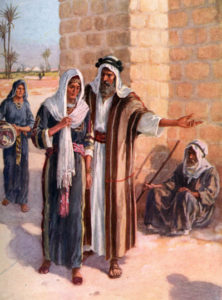 In Bereishis, we met Odom, Chava and the snake. We were taught (by the medrish) that the snake not only seduced Chava into eating of the forbidden fruit, but also had eyes, at least one, for her. He seduced her mamish and shoin. By the end of the parsha, the RBSO has second thoughts; His creations had gone rogue and astray. Illicit sex, including bestiality, homosexuality and other forms of sexual perversion had all become the reality of the day. A week and ten generations later, while on board with Noiach, we were taught that though sex was forbidden while the boat was rocking, three had forbidden relations while on the Teyvo (Ark). The dog, the raven, and Chom the minuvil. Let’s not forget what took place in the aftermath: The text told us that Chom and K’nan (Noiach’s son and grandson) either sodomized or castrated Noiach while he lie asleep in a drunken stupor. A week later in Lech Lecho, Avrohom instructed his eishes chayil Soro to lie and state that she was his sister. The result: Soro was taken to the King’s palace where an overeager King Paroy wanted to, but at the last second was unable to violate her.
In Bereishis, we met Odom, Chava and the snake. We were taught (by the medrish) that the snake not only seduced Chava into eating of the forbidden fruit, but also had eyes, at least one, for her. He seduced her mamish and shoin. By the end of the parsha, the RBSO has second thoughts; His creations had gone rogue and astray. Illicit sex, including bestiality, homosexuality and other forms of sexual perversion had all become the reality of the day. A week and ten generations later, while on board with Noiach, we were taught that though sex was forbidden while the boat was rocking, three had forbidden relations while on the Teyvo (Ark). The dog, the raven, and Chom the minuvil. Let’s not forget what took place in the aftermath: The text told us that Chom and K’nan (Noiach’s son and grandson) either sodomized or castrated Noiach while he lie asleep in a drunken stupor. A week later in Lech Lecho, Avrohom instructed his eishes chayil Soro to lie and state that she was his sister. The result: Soro was taken to the King’s palace where an overeager King Paroy wanted to, but at the last second was unable to violate her.
That parsha also featured Avrohom being given a pilegesh (concubine) by the name of Hogor. In Vayero, in a different country, this time in Geror, with another king, Avimelech, a similar scenario played out and Soro was again taken to the palace. Again the RBSO intervened; the king was unable to perform. Of course we all recall how in the same parsha, Loit’s two daughters, after being saved from the destruction which engulfed Sedoim (Sodom and Gomorrah), had their way with their father and how from that union, generations later, everyone’s second favorite (after Esther) Toirah personality by the name of Rus (Ruth) was the progenitor of no lesser a giant than Dovid Hamelech (king David) who seemingly carried the same gene pool and continued the legacy of forbidden relationships. Nu, we almost forgot how, also in Vayero, Loit, nice guy and concerned father that he was, offered his two virgin daughters in lieu of the “guests” the townspeople were demanding to have their way with. Rashi told us that the not-such nice people of Sedoim wanted to have homosexual relations with Loit’s guests. Only a last minute save by the malochim (posing as the guests) saved the girls from losing their virginity and being gang raped. Nu, mistama it was bashert (predestined) that they be deflowered instead in a cave by their own father a few pisukim later. Nice! Raboyseyee, these stories are all real. They are found in our heylige Toirah, a few color enhanced (and in certain cases, maybe also or only imagined) by the exegetes of the medrish.
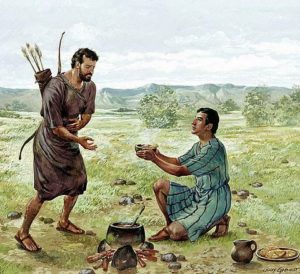 In Chaya Soro, Avrohom decided that his 40 year old son Yitzchok needed to be married and retained the services of his trusted servant Eliezer to travel and find him a suitable mate. Though Eliezer swore by holding onto his master’s groin area (penis), the medrish told us that Avrohom suspected Eliezer of advance chapping. Rashi made sure to tell us Rivka was a virgin, front and back. Who would have suspected otherwise from a virtuous three year old, unless of course, the camel ride caused a breakthrough? In Toldois, Yitzchok and Rivka also found themselves in Geror and were spotted through the window or other opening of their tent, (according to Rashi) ‘making sport’ (having sexual relations). Earlier, Yitzchok insisted that Rivka was his sister. They were busted. Shoin, it was Rivka’s turn in King Avimelech’s palace. Again the RBSO intervened, warned Avimelech, and Rivka was released unscathed. We also met Eisav, who after returning (according to the medrish) from raping a married woman and a few other dastardly acts, sold his birthright to his cunning brother.
In Chaya Soro, Avrohom decided that his 40 year old son Yitzchok needed to be married and retained the services of his trusted servant Eliezer to travel and find him a suitable mate. Though Eliezer swore by holding onto his master’s groin area (penis), the medrish told us that Avrohom suspected Eliezer of advance chapping. Rashi made sure to tell us Rivka was a virgin, front and back. Who would have suspected otherwise from a virtuous three year old, unless of course, the camel ride caused a breakthrough? In Toldois, Yitzchok and Rivka also found themselves in Geror and were spotted through the window or other opening of their tent, (according to Rashi) ‘making sport’ (having sexual relations). Earlier, Yitzchok insisted that Rivka was his sister. They were busted. Shoin, it was Rivka’s turn in King Avimelech’s palace. Again the RBSO intervened, warned Avimelech, and Rivka was released unscathed. We also met Eisav, who after returning (according to the medrish) from raping a married woman and a few other dastardly acts, sold his birthright to his cunning brother.
A week later, in Vayeytzei, we said hello to Yaakov who wanted to marry his love interest Rochel but instead wound up with four sisters (we previously learned that Lovon fathered them all.) One medrish told us that Rochel was hiding below -under the marital bed- and was doing the talking (to Yaakov) as he was on top consummating the marriage to her sister Leah. Nice teamwork! And let’s not avada forget how Reuvain, in the same parsha, collected mandrakes (a seemingly early form of chapping enhancer) for his mother Leah, how Rochel asked for them hoping they would help her conceive, and how Leah, wanting Yaakov that evening (for chapping purposes) refused to share them. But the best was still to come. Towards the very end of the parsha, we learned about the confrontation between Lovon and Yaakov during which Lovon warned Yaakov not to withhold sexual favors from his daughters, Yaakov’s wives. What a concerned father he was, a tzadik mamish!
And just last shabbis in parshas Vayishlach, we met Dina, Yaakov’s only daughter (though one medrish tells us that each boy was born with a twin sister who were seemingly not Toirah mention worthy) who was taken by Shechem against her will, and how that swine bucket low-life raped and otherwise manhandled and sodomized her. Revenge was plotted and executed by her brothers Shimon and Levi.
As an aside, earlier this week, the Oisvorfer was engaged in a discussion with chaver Yossie Segel when a Toirah discussion inadvertently broke out, say it’s not so. He asked why the brothers (Shimon and Levi), prior to wiping out all the male inhabitants of Shechem, used the bris ruse, during which they fooled all males in Shechem into thinking that following circumcision, their families could marry into the Yaakov mishpocho? Why taka did they do this? If they were old enough and strong enough (at 13 and 12+ respectively) to kill so many, why make the Shechemites undergo circumcision? Were they worried that they had too much skin in the game? Mamish a givaldige kasha. Ober, answered Yossie his own question (quoting a medrish) so gishmak, azoy: Had they killed all the Shechemites as they were -a bunch of goyim (Gentiles), fully intact, the entire world would have been screaming, oy vey, look what the Yiddin did. They committed mass murder! Let’s prosecute them in the Hague as war criminals.
What to do? They concocted a plan. Have the Shechemites undergo circumcision: they would now efsher be considered Jews or Hebrews, whatever that group was known as back in the day. And once they were considered Hebrews, and were killed, would the world care if a few thousand of them were killed? Who would protest the killing of Hebrews? The UN? A necthiger tug (fugetaboutitttt).
In Vayishlach, we also read how Reuvain went and slept with Bilah, his father’s wife. Rashi and a few medroshim of course posited that he did not sleep with her; he merely either moved the bed, or tussled with the linens and that he was an otherwise givaldige son who gave his parents only nachas. Such an upstanding son. Grada upstanding he mistama was when he bedded his step mother, if you chap. In a few weeks, Yaakov, still smarting from that incident, will remind Reuvain of his impetuosity and will strip him of his birthright. Few lose birthrights for re-arranging the furniture.
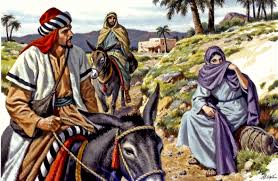 And if all those sexcapades weren’t enough for one amazing book of Bereishis (Genesis), welcome to parshas Vayeshev where -on erev Chanukah, the great holiday when the lights shine brightly- we will be reading yet more dark stories, these involving two more woman and the havoc they wreaked on two of Yaakov’s boys, perhaps his two favorite. This week we will look into -as stated above- not one, but two different sex acts. One consummated, and the other resulting in charges of attempted rape. Let’s learn and let us begin with a shtikel review of the Yehudah and Tamar caper.
And if all those sexcapades weren’t enough for one amazing book of Bereishis (Genesis), welcome to parshas Vayeshev where -on erev Chanukah, the great holiday when the lights shine brightly- we will be reading yet more dark stories, these involving two more woman and the havoc they wreaked on two of Yaakov’s boys, perhaps his two favorite. This week we will look into -as stated above- not one, but two different sex acts. One consummated, and the other resulting in charges of attempted rape. Let’s learn and let us begin with a shtikel review of the Yehudah and Tamar caper.
As a public service to his readers, the Oisvorfer went undercover, as did Yehudah, if you chap, to find out what went down, besides Yehudah, if you chap. Nu, lommer lernin but first, let’s meet the cast (Bereishis, chapter 38) which includes Yehudah and his unnamed wife, their three sons, and his daughter-in-law Tamar. Their boys were Eyr, Oinon, and Sheyla. Eyr, the eldest son, married a seemingly hot shiksa named Tamar and died childless. The heylige Toirah tells us that he was evil in the eyes of the RBSO. Interestingly enough, Tamar remains one of the most popular Jewish names for girls. Why, ver veyst? Seemingly the RBSO didn’t like Eyr. Why, we are not told and it’s none of our business, or, is it!? Though the heylige Toirah is silent mamish on why the RBSO didn’t like him, Rashi was curious and thought you might be as well. He has a tale to tell and tells us that the RBSO didn’t like Eyr just like He didn’t like Oinon. Shoin and now you know! Ober why didn’t He like Oinon? Nu, it’s taka good you asked; let’s learn Rashi innavaynig (the text).
| 7. Now Eyr, Yehudah’s firstborn, was evil in the eyes of the Lord, and the Lord put him to death. | ז. וַיְהִי עֵר בְּכוֹר יְהוּדָה רַע בְּעֵינֵי יְ־הֹוָ־ה וַיְמִתֵהוּ יְ־הֹוָ־ה: | |
| Was evil in the eyes of the Lord: [His evil was] like the evil of Oinon, viz. that he wasted his semen, as it is written in connection with Oinon: “and He put him to death also,” meaning that, as Eyr’s death, so was Oinon’s death. Now, why should Eyr waste his semen? So that she (Tamar) would not become pregnant and her beauty be impaired. [Yevomois. 34b] | רע בעיני ה’: כרעתו של אונן משחית זרעו, שנאמר באונן (פסוק י) וימת גם אותו, כמיתתו של ער מיתתו של אונן, ולמה היה ער משחית זרעו, כדי שלא תתעבר ויכחיש יפיה: |
He did what? He wasted semen? What chutzpah, mamish! And for that he died? Nu, it’s taka a miracle that any of you are still alive, if you chap. Ober, let’s stay focused on the real storyline. Anyway, he was dead and soon thereafter, Yehudah instructed the second son, Oinon, to marry his widowed sister-in-law (Tamar). Halt kup (pay attention) it gets more complicated. Though we had no Toirah yet and though the mitzvah of “Yibum”, (levirate marriage) is far off in the future (Devorim 25:5-10), seemingly Yehudah must have either practiced an early version of it, or was the first to introduce this practice. More on this below. What is levirate marriage? This mitzvah obligates one to marry his deceased brother’s wife if the deceased died childless. Oh, it also forbids the widow from marrying anyone else unless she gets a waiver through a ceremony called chalitza. What’s that? Whatever it is, it absolves both the brother and the widow from this obligation. In any event, Oinon married Tamar, but he, too, died without children. Seemingly he too was a seed spiller (see Rashi above).
Three sons and two dead; who’s left? One son still alive and poor Tamar is still childless. She has already buried two husbands, nebech. Yehudah, efsher afraid that his youngest son might also be a seed withholder (speculation by the Oisvorfer and others), feared that his third son, Sheyla, would suffer the same fate as his two older brothers, and therefore refused to allow Tamar to marry him, despite the levirate obligation or practice. Gentile Reminder: At least one medrish tells us that both Eyr and Oinon were but seven years old at this time. How they wasted semen at that age, ver veyst? Perhaps the rebbe helped out, ver veyst?
Seemingly, Tamar was driven to have children and concocted a plan. She posed as a zoina (prostitute), stood along the road as Yehudah traveled, and shoin the trap was laid as was Yehudah a few minutes later. Of course they needed to and did work out the financial arrangements up front. Unlike Oinon who refused to give up his seed, Yehudah was more than obliging and as we will soon learn, he gave her enough for two. Shoin, she was taka pregnant with twins. Seemingly Yehudah did the gantze myseh (act) without knowing that the zoina he was seeding was actually his daughter-in-law Tamar: yikes!! How is this possible, ver veyst! Oh- we left out one part: because he didn’t have the payment she demanded (a kid goat), he was good enough to leave her with his ring, his staff and other identifying items, as collateral to be returned when he delivered the goat. Raboyseyee, one cannot make this stuff up; this myseh (story) is in the Toirah mamish. Honorable person that he was and also a satisfied customer following a happy ending, he asked his buddy, Chira, to find her and settle up the account. Chira was also to retrieve the collateral, ober Chira could not find her. Seemingly, Tamar had returned home. So far so good and it taka sounds no different than any other person soliciting and paying for roadside services. Ober listen to this bombshell.
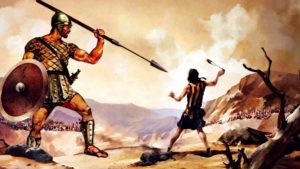 When word reached Yehudah that Tamar was pregnant, he reacted by immediately sentencing her to death by fire for infidelity. Read that again because as you can imagine we will have questions, a few. Prior to her scheduled execution, Tamar produced Yehudah’s items (the collateral she was holding) which proved that the pregnancy came about through Yehudah’s other staff, if you chap. Though Maury Povich was not there with the DNA test, Yehudah fessed up; he was indeed the expectant father of what was growing in Tamar’s womb. He issued a reprieve, an apology, and stated the she (Tamar) was more correct than he. Let’s remember these words. Tamar delivered twin boys, Peretz and Zorach. Peretz went on to become the progenitor of the royal dynasty of Dovid Hamelech (King David see Rus, 4:18-22).
When word reached Yehudah that Tamar was pregnant, he reacted by immediately sentencing her to death by fire for infidelity. Read that again because as you can imagine we will have questions, a few. Prior to her scheduled execution, Tamar produced Yehudah’s items (the collateral she was holding) which proved that the pregnancy came about through Yehudah’s other staff, if you chap. Though Maury Povich was not there with the DNA test, Yehudah fessed up; he was indeed the expectant father of what was growing in Tamar’s womb. He issued a reprieve, an apology, and stated the she (Tamar) was more correct than he. Let’s remember these words. Tamar delivered twin boys, Peretz and Zorach. Peretz went on to become the progenitor of the royal dynasty of Dovid Hamelech (King David see Rus, 4:18-22).
And now for the questions. Ershtens: what sin did Tamar commit? Her husbands were dead and she a more than eligible beautiful widow. Was she taka beautiful? Seemingly she was and says Rashi (see above) and who knew her better, that both Eyr and Oinon refused to give her seed, lest they impair her beauty with a pregnancy. Moreover, Yehudah, now spooked by the death of two sons, refused to give her his third and who could blame him? Moreover, says Rashi azoy: though Yehudah told Tamar to wait until Sheyla grew up, he had no intentions of ever letting that husband killer near his only surviving son. In other words: Yehudah was deceiving her. She was single and very much available to service anyone she pleased.
Ober, was prostitution illegal at the time? And while we have zicher heard of zoinas being busted and having to spend a night behind bars, wasn’t a death sentence by fire a bit harsh? Moreover, how could Yehudah, the son of Yaakov Oveenu, one of the future holy shevotim (tribes) engage a prostitute for sexual favors? It’s taka emes he was away, as the Toirah tells us, ‘on business,’ if you chap, ober es-pas- nisht (it was unbecoming). It’s one thing for this fine gentleman to suggest that his brothers not kill Yoisef but instead sell him into slavery for $20 worth of shamattis, ober to solicit roadside favors? Oy vey! Moreover, if Tamar was taka guilty of some crime, what was it and why did Yehudah choose to exonerate her just because she was now pregnant with his child?
Nu some say that she was betrothed which back then meant engaged to Yehudah’s youngest son, and in that state, was forbidden to any other man. Seemingly that would include Yehudah and by having roadside assistance, if you chap, she violated the laws of Yibum (which avada didn’t yet exist). Says the Gur Aryeh azoy: Yehudah too, like his father, grandfather and great- grandfather, kept the entire Toirah tough it would be hundreds of years before it was given. And if he did, a sexual encounter with his daughter-in-law was strictly prohibited. He therefore sent her to death. As to why he didn’t sentence himself to death, for he was the perpetrator of the encounter, ver veyst? Ober if that’s the case, how and why did Yehudah forgive her once it was discovered that it was he that had delivered the goods? Ver veyst? And finally, what is this story doing in-mittin-derinin- in the middle of the amazing Yoisef and his brothers’ tale which continues immediately thereafter? Nu so many questions, let’s see if we can proffer a few answers.
Ober says the RambaM (Mishneh Toirah Hilchois Ishus 1:4) azoy: Yehudah’s hands were clean: he was a standup guy. Zicher he was, if you chap, which he did. And maybe he washed them when he got home, ver veyst. Efsher you’re still wondering how Yehudah could be viewed as innocent? Ober says the RambaM so gishmak azoy: Before Matan Toirah on Har Sinai, and zicher before AAA and On-Star, should a person be in need of roadside assistance, if you chap, such a person would meet a woman in the public square. If both parties consented, he would give her payment and engage in relations with her along the road and then leave. Hence the term roadside assistance! Gishmak! Side comment: seemingly not much has changed! In any event, let’s also recall that Yehudah was efsher lonely; his eishes chayil (wife), the daughter of Shua, had died and he, Yehudah, was nebech tzibrochen (broken hearted). How does one mend a broken heart? Nu, In order to recover from his grieving, Yehudah arranged a business trip, if you chap, to Timna for some well deserved “R and R” with his old buddy, Chira the Adulamite, and shoin, when the boys were away on business, a little pleasure broke out, why not? Grada this pleasure was preceded by a business transaction.….
 And listen to this. Says the RambaM: prostitution, and for that matter, any sexual relations conducted outside the framework of marriage is outright forbidden by the heylige Toirah! It is? Ober seemingly and maybe even definitively, it was mamish mutir (permissible) before Matan Toirah. The status of prostitution changed with Matan Toirah. Lommer chazerim (review): before the Toirah was given, any relationship conducted with the mutual consent of both parties was permitted, ober immediately thereafter, one was limited to chapping at home, or elsewhere, but not with a zoina. Nu, efsher you’re klerring azoy: given that zoinas (for pay) were outlawed, is chapping a freebie outside the marriage ok? Nu, avada one shouldn’t do this; zicher one shouldn’t get caught. Accordingly, Yehudah, in need of service did nothing wrong by engaging a prostitute. Shoin, case closed and all parties innocent.
And listen to this. Says the RambaM: prostitution, and for that matter, any sexual relations conducted outside the framework of marriage is outright forbidden by the heylige Toirah! It is? Ober seemingly and maybe even definitively, it was mamish mutir (permissible) before Matan Toirah. The status of prostitution changed with Matan Toirah. Lommer chazerim (review): before the Toirah was given, any relationship conducted with the mutual consent of both parties was permitted, ober immediately thereafter, one was limited to chapping at home, or elsewhere, but not with a zoina. Nu, efsher you’re klerring azoy: given that zoinas (for pay) were outlawed, is chapping a freebie outside the marriage ok? Nu, avada one shouldn’t do this; zicher one shouldn’t get caught. Accordingly, Yehudah, in need of service did nothing wrong by engaging a prostitute. Shoin, case closed and all parties innocent.
Nu, as we just read and as will read further below, the RambaM and others went out of their way to exonerate Yehudah. They proffer several theories as to why he was a good guy. Ober what about poor Tamar? If Yehudah was accusing her of having relations because she was, according to the practice of Yibum to marry his son…..but since he had no intentions of giving her that son, was Yehudah epes not guilty of ‘chaining’ Tamar, Aguna style? Though the Oisvorfer has researched this topic, he cannot find logical explanations as to Tamar’s guilt. If anyone can help, feel free to answer.
Nu, since we’re discussing the RambaM’s whitewashing of Yehudah’s actions, let’s go a shtikel further into the topic of Yibum, it won’t kill you. Says the RambaN (Nachmanides Bereishis 38:8) azoy: this mitzvah embodies “one of the great mysteries of the Toirah,” and that even before the heylige Toirah was given, people knew of the spiritual benefits of a levirate marriage. And says Rabaynu Bechayei (Devorim 25): the child born of the union between the brother of the dead man and his former wife—both of whom are intimately connected with the deceased man—is considered the spiritual son of the deceased. And says the Zoihar (2:104b) azoy: the firstborn child of the levirate marriage is a reincarnation of the soul of its mother’s first husband, bringing the deceased man, as it were, back to life. Gishmak! Ober not to worry because during the past 1,500 years, since Talmudic times, the universal custom of Ashkenazic communities is to prefer chalitzah to levirate marriage. Seemingly, most people want kids that are not reincarnations, who can blame them.
And who was the first human being to introduce this practice of levirate marriage? Says the medrish (Bereishis Rabbah 85:5, quoted in the Ramban) azoy: it was Yehudah who suggested that son #2 marry his brother’s widow Tamar. Mistama the idea being to perpetuate the legacy of the deceased brother. Shoin!
And listen to this. Says the RambaN (end of Rus) azoy: before matan Toirah, when it came to Yibum, other relatives in addition to brothers, used to carry out this obligation of levirate marriages. OMG! Tamar of course knew this and when Yehudah refused to give her his third son, she took matters into her own hands, dressed up, took up her position on the road and chapped Yehudah. Seemingly, her hands were also clean; she was merely following the custom of the times. With great ingenuity and boldness, Tamar broke the bind her shver put her into. In the end, Yehudah and Tamar got married and lived happily ever after and also fulfilled the mitzvah, or pre-mitzvah, or whatever it was at the time, of levirate marriage. Gishmak mamish!
Nu, with all that said efsher you’re still scratching your head and wondering why Yehudah was selected to be the elter zedya of the Moshiach (Messiah)? And why will Moshiach, the greatest leader of history, who will inspire the world to embrace a life of goodness and holiness and usher in the messianic age, emerge from epes an irregular roadside quickie that led maybe to a levirate marriage? Why taka did the RBSO arrange matters -and let’s not fool ourselves, He was behind all these machinations- and davka (specifically) want the Davidic dynasty to be seeded -and seeded it was- from a series of illicit and otherwise questionable relationships beginning with Loit and his two daughters, followed a few generations later by Yehudah and his former daughter in law Tamar, to be followed later by Boaz’s one night stand with Rus (some say he died immediately after seeding Rus whom he found lying just beside him)? Does not the great and very uplifting Book of Rus end with the generations that were born from Rus the Moabite? Does it not end with the birth of Dovid Hamelech? Yes and yes! Would we not have expected the RBSO to select a fine young man from a good family? Efsher a nice yeshiva boy who went on to learn in a Lakewood Kollel for a number of years before becoming a either a magid shiur or even the roish yeshivah? Is the RBSO telling us something? Was Dovid Hamelech merely carrying on the tradition? Was he but hoping to seed the Moshiach while seeding Batsheva? Davka that excuse for bedding a married Batsheva would be more logical and easier to accept than any other proffered. The bottom line: should you find yourselves in a compromising position, try telling the eishes chayil that you are following the mesoira (tradition) of our forefathers and other great leaders, including Dovid Hamelech. You are seeding the Moshiach.

And one last question we asked earlier: why does the heylige Toirah recount this Yehudah Tamar drama by interrupting the story of Yoisef and his sale into slavery by his own brothers? Says the medrish (Bereishis Rabbah 85:1) mamish so gishmak azoy: “The sons of Yaakov were engaged in selling Yoisef; Yoisef was busy with his sackcloth and fasting; Yaakov was taken up with his sackcloth and fasting; Reuvain was engaged in his sackcloth and fasting; Yehudah was busy taking a wife. And what does that mean? Seemingly, while other family members mourned, Yehudah was involved in productive pursuits, getting married and establishing a family. “And the RBSO? What was the RBSO doing at that time? “The Holy One, blessed be He, was engaged in creating the light of Moshiach.” (Peretz, born from Yehudah and Tamar, is the ancestor of King David and the Moshiach, as stated above.)
In other words, amidst the turmoil and politics pervading the fledgling Jewish tribe at the time—in the middle of Yoisef being sold into slavery by his wonderful and holy brothers, the event which ultimately brought about the first exile of the Yiddin from under Paroy the minuvil in Mitzrayim, the RBSO was planting within the history the seeds for the ultimate messianic redemption, by orchestrating a relationship which brought forth to the world the seed of Moshiach. Yehudah followed suit and also did his own planting. Seemingly, we must conclude that all this was bashert, isn’t everything, and, we must accept that the strange roadside encounter between father –in-law and daughter-in law, was all part of the RBSO’s paving the road for redemption and Moshiach. Shoin: at times, one must hit the road.
And why do the Rabbis like Yehudah? Ershtens, when confronted, he took responsibility for his actions. Said Yehudah (38:26): “She has been more righteous that I”. Yehudah could have simply put Tamar to death, and no one would have known of the embarrassing incestuous relationship he had with his daughter in law. Nonetheless, once again, he rose to the occasion, if you chap, and pronounced two of the most heroic words in human history, (Genesis 38:26) “Tzodkah me’meni!” “She, Tamar, is more righteous than I.” It is my fault not hers that this happened, since I did not allow my son, Shayla, to marry Tamar. Secondly, we can kler that with these two words, Yehudah became history’s first Ba’al Teshuvah (lit: master of return” i.e., one who has “returned” to God), yet another business that is Toirah inspired and has become a multibillion dollar gisheft. And as the Oisvorfer always tells you: there’s no business like Toirah inspired business.
Tamar committed no crime by having sex with her former father-in-law. Let’s recall that two of Yehudah’s son’s died prematurely when they too acted by withdrawing prematurely, if you chap, and that it was Yehudah who that told Tamar to wait for his third son to grow up before he would allow Tamar to marry him. It was Yehudah who broke his promise, and it was Yehudah who was lonely -so lonely- that he was determined to have a roadside encounter though the harlot’s face was covered. Shoin, again we are left scratching our heads. And Yehudah was blessed and rewarded with kingship and more?
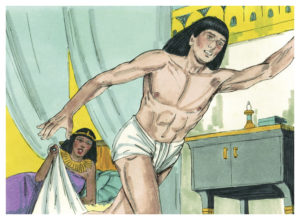 As advertised, the parsha contains yet another very interesting relationship, one whose narrative in great detail, the RBSO deemed worthy of inclusion in His heylige Toirah. By the time we get to ‘shishi’ the sixth reading of the parsha, Yoisef has been sold into slavery, and after being bounced around from buyer to buyer, he has finally landed in Mitzrayim (Egypt) where he was purchased by Potiphar, the head of the butchers. Potiphar likes Yoisef, trusts him and Yoisef is doing ok for himself considering that he is a Hebrew slave ripped away from his family. He runs the Potiphar household. Ober the drama begins when the heylige Toirah tells us that Mrs. Potiphar liked him as well. Said she (Bereishis 39:7) azoy: “Soon afterwards his master’s wife cast her eyes upon Yoisef and said to him, “Lie with me.”” She was not asking Yoisef to tell a lie as did other good people (each of our forefathers) we met in previous parshas. Instead, she asked Yoisef to bed her, mamish! She wanted him! Ober Yoisef refused. Rashi, the heylige Gemora, and many a medrish, pontificate on specifically why Yoisef refused to give in to her advances. They imagine several different reasons. Ober, one medrish tells us that Yoisef was about to succumb to her daily advances. In any event, unlike Tamar, who when rejected by Yehudah from marrying his third son, came up with an alternate plan by going roadside for an encounter where she wound up pregnant from his one staff, if you chap, while holding onto his other as collateral for payment, Mrs. Potiphar, who goes unnamed in the heylige Toirah, instead yelled rape when Yoisef ran out and left his shirt behind. Sadly, this is the second time Yoisef ended up shirtless. You will avada recall that his holy brothers, just before throwing him into a pit filled with snakes and scorpions (so says Rashi), also removed his shirt. Though innocent mamish of the rape allegation, Yoisef next landed in the clink where he would spend (according to Rashi), a total of twelve years. We will be discussing and exploring Yoisef in depth over the next three weeks; stay tuned for gishmak medroshim.
As advertised, the parsha contains yet another very interesting relationship, one whose narrative in great detail, the RBSO deemed worthy of inclusion in His heylige Toirah. By the time we get to ‘shishi’ the sixth reading of the parsha, Yoisef has been sold into slavery, and after being bounced around from buyer to buyer, he has finally landed in Mitzrayim (Egypt) where he was purchased by Potiphar, the head of the butchers. Potiphar likes Yoisef, trusts him and Yoisef is doing ok for himself considering that he is a Hebrew slave ripped away from his family. He runs the Potiphar household. Ober the drama begins when the heylige Toirah tells us that Mrs. Potiphar liked him as well. Said she (Bereishis 39:7) azoy: “Soon afterwards his master’s wife cast her eyes upon Yoisef and said to him, “Lie with me.”” She was not asking Yoisef to tell a lie as did other good people (each of our forefathers) we met in previous parshas. Instead, she asked Yoisef to bed her, mamish! She wanted him! Ober Yoisef refused. Rashi, the heylige Gemora, and many a medrish, pontificate on specifically why Yoisef refused to give in to her advances. They imagine several different reasons. Ober, one medrish tells us that Yoisef was about to succumb to her daily advances. In any event, unlike Tamar, who when rejected by Yehudah from marrying his third son, came up with an alternate plan by going roadside for an encounter where she wound up pregnant from his one staff, if you chap, while holding onto his other as collateral for payment, Mrs. Potiphar, who goes unnamed in the heylige Toirah, instead yelled rape when Yoisef ran out and left his shirt behind. Sadly, this is the second time Yoisef ended up shirtless. You will avada recall that his holy brothers, just before throwing him into a pit filled with snakes and scorpions (so says Rashi), also removed his shirt. Though innocent mamish of the rape allegation, Yoisef next landed in the clink where he would spend (according to Rashi), a total of twelve years. We will be discussing and exploring Yoisef in depth over the next three weeks; stay tuned for gishmak medroshim.
Ober once again, we need to ponder why the RBSO allowed Yoisef to find himself in a compromising position which landed him in the big house? Was Yoisef a sinner? Not! He was a good guy. Few Toirah personalities are forever known by the appellation ‘Tzadik’ (righteous). Yoisef is. In fact, it might be argued that Yoisef is the most popular Toirah character of all. Likely more beloved than Moishe. Why did the RBSO select Mrs. Potiphar to engage, or try to engage him, in an illicit sexual act? Once again raboyseyee we need to conclude that this was all part of the master plan. The RBSO was the Master Puppeteer behind the scenes, plotting each and every move and counter-move between Yoisef and Mrs. Potiphar. Why? Ver veyst.
And what can we learn from these two women, both of whom had designs and desires for two of Yaakov’s favorite sons? Why did the RBSO employ the services of two women, both of whom employed sex as a means, to perhaps entrap Yehudah and Yoisef, both destined to play such critical roles in the formation of Jewry, royalty and kingship? Says the Oisvorfer azoy: It’s quite poshit: they too were part of the master plan. Both Yehudah and Yoisef indeed played key roles for the Yiddin. Nu, efsher as a reward, or efsher to entice them into their leadership roles, He allowed them to enjoy the company of women, perhaps very good looking ones. One thing is zicher: this pshat is logical, fits the narrative, and does not require one to believe a series of strange medroshim which tell us that Tamar was the daughter of Sheym who was a koihen (priest) and therefore, as a bas-koihen who committed adultery, was deserving of the death penalty for having roadside sex. Why is that medrish so hard to believe? Because let’s get real: Sheym was no koihen! He wasn’t even Jewish or a Hebrew. He was the son of Noiach who himself was not Jewish. Let’s get with the program please.
And as to Mrs. Potifar, she the seemingly adulteress wife of Mr. Potifar, well guess what? Maybe she too was innocent. Our sages will teach us that she too had a vision. Maybe a dream or fantasy, ver veyst, but certainly a vision. We will be taught that she too somehow prophetically learned that she was somehow destined to have a share in the ancestry of the Yiddin. She foresaw that children that she and Yoisef would sire, would be involved in the leadership of the Jewish People. Ober how would she, while married to Mr. Potifar, achieve this goal? Shoin, the RBSO arranged things so that Yoisef was eventually sold to Mr. Potifar as his slave. She too sprang into action and tried seducing him. Ober her dreams and visions were off by a generation. Again our sages will teach us that Osnas, Yoisef’s wife whom we will meet next week, was none other than the daughter of Mrs. Potifar. Some will argue and teach us that it was Dina, his own step-sister, ober that for another time. As an aside, still others will tell us that Osnas was the adopted daughter of Mr. and Mrs. Potifar claiming that Dina, following the shame of her rape by Shechem that chazir minuvil, was kicked out of the Yaakov Ovenu mishpocho, ran off to Mitzrayim, and wound up in the Potifar household. Was she the first foster child? Could that have happened? Why not? Shoin, whoever she was, Mrs. Potifar’s vision and dream of being somehow involved in the ancestry of the Yiddin, was off by a generation. Seemingly Yoisef’s vision was better; besides, Osnas was much younger, better looking and mistama in better shape. Shoin, she too is innocent.
 And our hero Yoisef, he too had dreams and visions, two of them. And because he had two dreams, his vision was even clearer. Our rabbis will teach us that when dreams are repeated, they are clearer and might indeed be a prophetic vision. He chapped that his dreams which had similar messages must be a prophetic vision of things to come. He was right.
And our hero Yoisef, he too had dreams and visions, two of them. And because he had two dreams, his vision was even clearer. Our rabbis will teach us that when dreams are repeated, they are clearer and might indeed be a prophetic vision. He chapped that his dreams which had similar messages must be a prophetic vision of things to come. He was right.
So happens that Yoisef was not the first dreamer. If we turn back two parshas, we will find that Yaakov also had two dreams. One when he left his father’s home and the other, when the RBSO told him to leave Lovon and return home. Yaakov shared his dreams with his wives and they bought in. We will also find that the RBSO came to Lovon in a dream and warned him not to harm Yaakov. He listened. And if we turn back some more, we will find that the RBSO also came to Avimelech -he the King that took Soro and wanted her to share his magic scepter, if you chap- in a dream and warned him not to lay a hand on her. He got the message. The bottom line: Dreams seem to be a good medium. And says the heylige Gemora (Brochis 55a) azoy: “Nothing happens to a man, good or evil, before he has beheld some intimation of it in a dream.” The RBSO will use them again even when He wants to communicate with villains. Think Bilam. It’s good to dream and to have visions. Some dreams can be messy, if you chap, and it’s safe to assume that those are but fantasies and zicher not prophetic. Avada, not always is the RBSO sending you a message, ober, with some good luck and hard work, maybe your dreams too can come true.
A gittin Shabbis-
The Oisvorfer Ruv
Yitz Grossman
